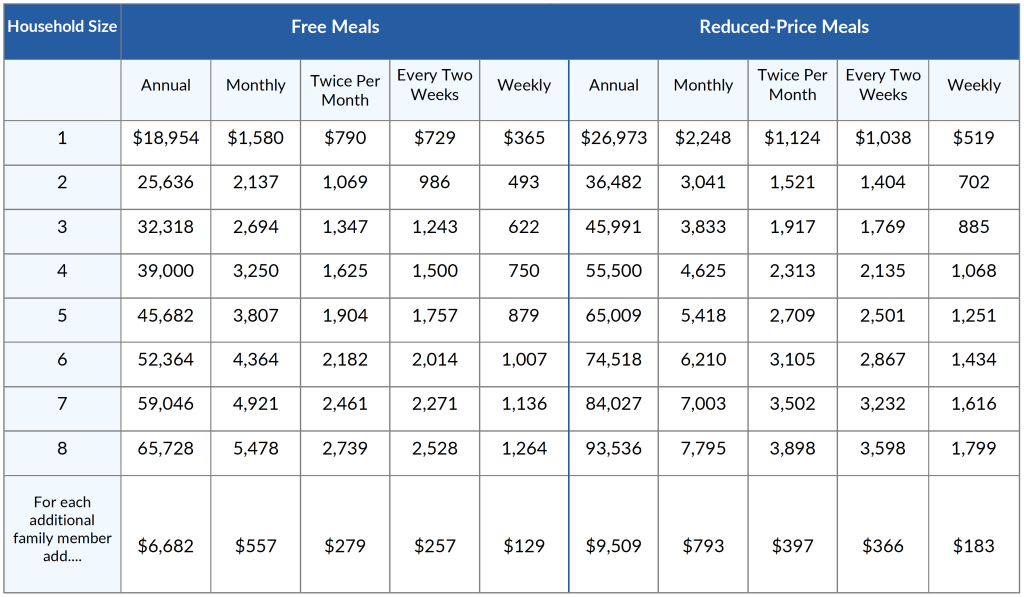New Guidelines Announced for Free and Reduced-Price School Meals
FOR IMMEDIATE RELEASE
MEDIA CONTACT:
Sylvia Lawson, 410-767-0463
[email protected]
PROGRAM CONTACT:
Julie Fletcher, 410-767-0219
[email protected]
New Guidelines Announced for Free and
Reduced-Price School Meals
Guidelines benefit children most in need and ensure a nutritious breakfast
and lunch each school day
BALTIMORE (September 29, 2023) – The Maryland State Department of Education (MSDE) has recently announced updates to the Income Eligibility Guidelines (IEGs) for free and reduced-price school meals. These IEGs, established by the federal government and adopted by MSDE, play a crucial role in determining eligibility for free or reduced-price meals in child nutrition programs. These guidelines will be in effect from July 1, 2023, through June 30, 2024.
The adjustments to the IEGs are mandated by Section 9 of the Richard B. Russell National School Lunch Act and are carried out annually by the U.S. Department of Agriculture (USDA). The primary aim of these adjustments is to directly benefit children who are most in need, and they are revised each year to account for changes in the Consumer Price Index.
Eligibility is typically determined based on household size and income. For example, a child from a family of four qualifies for free school meals if their household’s annual income is below $39,000. If the family’s income falls between $39,001 and $55,500, the child becomes eligible for reduced-price meals. The IEGs were established by multiplying the 2023 federal income poverty guidelines by 130% to determine the household income levels for free meal eligibility, and by 185% for reduced-price meal eligibility. It is important to note that United States citizenship is not a requirement for eligibility for these meal programs.
The Maryland Cares for Kids Act ensures state funding to cover the cost of meals for reduced-priced students. Certain groups of children, such as those enrolled in Head Start, Even Start, certified as homeless, migrant, runaway, foster children, or living in households receiving Food Supplement Program (FSP) or Temporary Cash Assistance (TCA) benefits, automatically qualify for free meals and do not need to submit an application.
Some FSP, TCA, and Medicaid households will receive notification letters from the school, indicating their children’s eligibility for free or reduced-price meals. Those who do not receive such letters at the beginning of the school year should complete an application.
Meal benefit applications are made available at the start of the school year. It’s essential for parents and guardians to ensure that their applications are complete when submitting them to the school, as incomplete applications cannot be processed. Following a review, schools will notify households about their children’s eligibility for free or reduced-price meals. In cases where there are concerns or disagreements, parents and guardians can reach out to school officials for clarification or appeal the decision, even requesting a hearing with the school district’s administrators.
Parents and guardians have the option to reapply at any time during the school year. This is encouraged, especially if the household size increases, if parents or guardians become unemployed, if income decreases, or if the household becomes eligible for FSP or TCA. The school meal programs encompass the National School Lunch Program and the School Breakfast Program, both of which are administered in Maryland by MSDE and adhere to nutrition standards set by the USDA.
For additional information on Child Nutrition Programs in Maryland, you can visit www.eatsmartmaryland.org or contact the Office of School and Community Nutrition Programs at the Maryland State Department of Education at (410) 767-0219.

###
New Guidelines Announced for Free and Reduced-Price School Meals – 09.29.2023